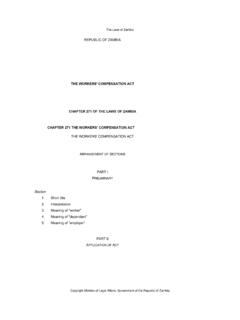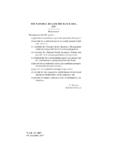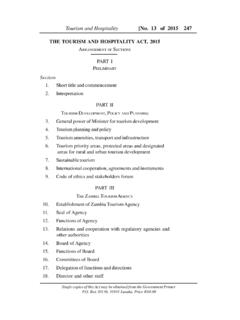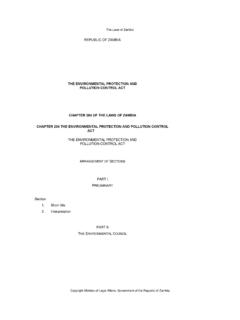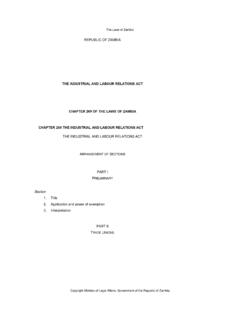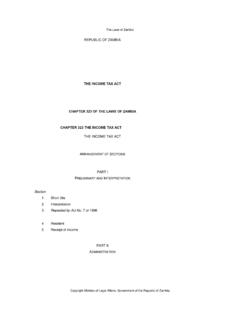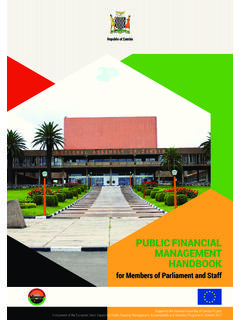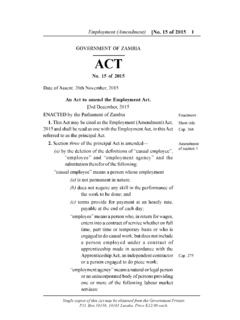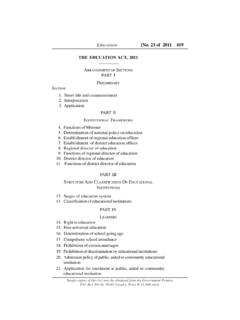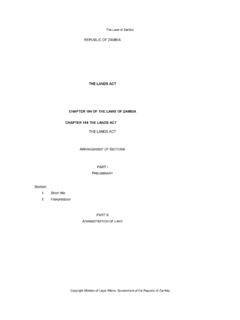Transcription of Court of Appeal Act No 7 of 2016 - National Assembly of …
1 Court of Appeal [No. 7 of 2016 345. THE Court OF Appeal ACT, 2016. ARRANGEMENT OF SECTIONS. PART I. PRELIMINARY PROVISIONS. Section 1. Short title and commencement 2. Interpretation PART II. CONSTITUTION, JURISDICTION AND GENERAL POWERS OF THE Court . 3. Composition of Court 4. Jurisdiction of Court 5. Sittings of Court 6. Restrictions regarding sitting on appeals 7. Seal 8. Practice and procedure 9. Powers of single judge 10. Determination of Court 11. Delivery of judgment PART III. APPEALS. General Provisions 12. Right to Appeal 13. Leave to Appeal Criminal Appeals 14. First Appeal 15. second Appeal 16.]
2 Determination of criminal appeals 17. Right of appellant to be present at hearing Copies of this Act can be obtained from the Government Printer, Box 30136, 10101 Lusaka. Prices each. 346 No. 7 of 2016] Court of Appeal 18. Provisions on bail 19. Stay of execution of sentence of death 20. Supplementary powers of Court 21. Time for appealing in criminal matters Civil Appeals 22. Right of Appeal in civil matters 23. Restrictions on civil appeals 24. Powers of Court on appeals in civil matters 25. Appealing in civil matters PART IV. GENERAL PROVISIONS. 26. Registrar and other officers 27. Costs and taxation of costs 28.
3 Administration of oath 29. Warrant for production of appellant before Court 30. Rules of Court Court of Appeal [No. 7 of 2016 347. GOVERNMENT OF ZAMBIA. ACT. No. 7 of 2016. Date of Assent: 2nd May, 2016. An Act to provide for the jurisdiction and procedures of the Court of Appeal ; the hearing of appeals from the High Court and quasi judicial bodies; and matters connected with, or incidental to, the foregoing. [3rd May, 2016. ENACTED by the Parliament of Zambia Enactment PART I. PRELIMINARY PROVISIONS. 1. This Act may be cited as the Court of Appeal Act, 2016, and Short title shall come into operation on such date as the Minister may appoint and commence- by statutory instrument.]]
4 Ment 2. In this Act, unless the context otherwise requires Interpretation appellant means a party appealing to the Court from a judgment of the High Court or a quasi judicial body, except a local government elections tribunal;. Constitutional Court means the Constitutional Court established under Article 127 of the Constitution; Cap. 1. Court means the Court of Appeal established under Article 130 of the Constitution; Cap. 1. Deputy Judge President means the Deputy Judge President of the Court appointed under section three;. Director of Public Prosecutions means the person appointed as such under Article 180 of the Constitution; Cap.
5 1. High Court means the High Court established under Article 133 of the Constitution; Cap. 1. Judge President means the Judge President of the Court appointed in under section three;. 348 No. 7 of 2016] Court of Appeal judgment includes decree, ruling, order, conviction, sentence and decision;. judicial function has the meaning assigned to it in the Cap. 1 Constitution;. local government elections tribunal means a tribunal established in accordance with Article 159 of the Cap. 1 Constitution;. Cap. 30 practitioner has the meaning assigned to it in the Legal Practitioners Act;. quasi-judicial body means a body, other than a Court , exercising a judicial function.
6 Registrar means the Registrar of the Court appointed under section twenty-six;. rules means rules of the Court made pursuant to section thirty; and Supreme Court means the Supreme Court established Cap. 1 under Article 124 of the Constitution. PART II. CONSTITUTION, JURISDICTION AND GENERAL POWERS. OF THE Court . Composition 3. The Court consists of . of Court (a) the Judge President;. (b) the Deputy Judge President; and (c) such number of judges as may be prescribed. Jurisdiction 4. (1) The Court has jurisdiction to hear appeals from of Court judgments of . (a) the High Court ; and (b) a quasi judicial body, except a local government elections tribunal.
7 (2) Despite subsection (1), where a question relating to the Cap. 1 Constitution arises before the Court , the Court shall refer that question to the Constitutional Court . Court of Appeal [No. 7 of 2016 349. 5. (1) The sittings of the Court shall, before its devolution to Sittings of the provinces and districts, usually be held at Lusaka but may be Court held at such other place as may be specified in a circuit schedule issued by the Chief Justice. (2) The Court shall, at a sitting, be constituted by an uneven number of judges not being less than three except when hearing an interlocutory application which may be heard by a single judge.]
8 6. A judge of the Court shall not sit on the hearing of an Appeal Restriction or exercise a power in respect of an Appeal from a judgment given regarding sitting on by that judge or a judgement given by a Court of which that judge appeals sat as a member. 7. The Court shall have a seal approved by the Chief Justice. Seal 8. (1) The jurisdiction vested in the Court shall, as regards Practice and procedure practice and procedure, be exercised in the manner provided by this Act and the rules. (2) Despite subsection (1), where this Act or the rules do not provide for a particular point of practice or procedure, the practice of the Court shall be.
9 (a) in relation to civil matters, in accordance with the Supreme Court Practice, 1999 (White Book) of England and the law and practice in the Court of Appeal in England in force up to 31st December, 1999; or (b) in relation to criminal matters, as nearly as may be in accordance with the law and practice for the time being observed in the Court of Criminal Appeal in England. 9. A single judge of the Court may exercise a power vested in Powers of the Court not involving the decision of an Appeal , except that single judge (a) in criminal matters, if a judge of the Court refuses an application for the exercise of any such power, the person making the application is entitled to have that person's application determined by the Court ; and (b) in civil matters, an order, direction or decision made or given in pursuance of the powers conferred by this section may be varied, discharged or reversed by the Court .
10 10. The determination of a question before the Court shall be Determination according to the opinion of the majority of the judges of the Court of Court hearing the matter. 350 No. 7 of 2016] Court of Appeal Delivery of 11. A judgment of the Court shall be delivered . judgment (a) in the case of criminal matters, in open Court immediately after the termination of the Appeal or, without undue delay, at some subsequent time of which notice shall be given to the parties and the parties' practitioners, if any; or (b) in the case of civil matters, in such manner as the Court may determine. PART III.
